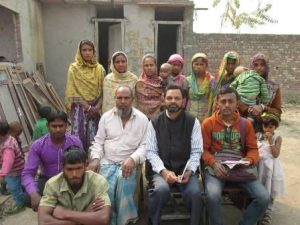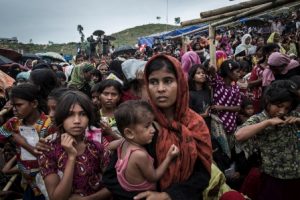Being a refugee is definitely the harshest experience: Ubais Sainulabdeen
Independent Human Rights Activist Ubais Sainulabdeen who has been working for refugees in India for over three decades says that those who have come to India seeking refuge remain disappointed which “definitely questions our values and morality as humans”.

For Ubais Sainulabdeen, a chance encounter with a group of people locked inside a fence stonewalled by CRPF guards, led him to his life’s calling. When he saw small children starving inside the fence, out of desperation, the young Ubais purchased a loaf of bread and passed it inside the fence. However, that was when he received a blow on his back from one of the CRPF guards. He was taken to a nearby hospital for treatment after he fell unconscious.
However, later on, he again came back to help the people. Taking a hundred rupee note from his friend, Subbayyan, Ubais bought bread and distributed it to the impoverished people there. Since a large crowd gathered, CRPF guards couldn’t resort to action. The unconditional love, he received from the people behind the fence changed the “whole narrative” of his life. They were none other than refugees from civil war-torn Sri Lanka who came from the country which saw widespread ethnic violence spanning more than two decades.
Meanwhile, Ubais started to visit them often at a time when the Indian government was keeping a close watch on people who had relations with refugees. In one such incident, he was investigated for links with Tamil militant organisation LTTE or Liberation Tigers of Tamil Eelam.
What started with the Sri Lankan refugees transformed Ubais into a humanitarian figure working for refugee communities who have sought refuge in different parts of the country along with the ones who have been internally displaced within the country.
Also read: Pakistan refugees in India: Partition stories that never faded
“As a refugee rights’ activist and a rehabilitator since 1988, he has worked for Pakistani Hindu refugees and Kashmiri Pandits from Sindh region of Pakistan in 2000.”
It was Ubais and his team that reported live from the location where a fire broke out at the Pakistani Hindu refugee camp in 2016.
He has implemented various projects for the Pakistani Hindus such as distributing ration for widows under his scheme of ‘You Are Not Alone’, and providing children with educational resources, an act constituted under the School of Humanity project.
“Late Chitta Basu MP from Barasat, West Bengal, helped me to apprehend the fact that people who come to India as refugees are our own brothers. He was an absolute humane personality. British Government forcefully used to recruit Indians to work in various nations including Sri Lanka and Myanmar and so on, during their rule. It was mostly their descendents who were coming for safety and security to India,” says Ubais who hails from Kerala’s Trivandrum.
Now, Ubais is involved with Rohingya refugees in India. Statistics point to about 1,36,000 Rohingyan refugees in India. “There are thousands living in hardship and destitution in the Rohingyan camps of North India. The scene of infants struggling in the extreme winters without a shawl to cover themselves is so disturbing to watch. I see it as a blessing to serve those people who are in need irrespective of their background,” says Ubais who has a bag manufacturing unit in Trivandrum which is run by his nephews.
On the Rohingyan refugee crisis, he says, “At a time when I started further understanding about refugee crisis, I came to the conclusion that the seeds of the issue were sown by radical Buddhists of Sri Lanka, Indonesia, Thailand and Myanmar. The birth of LTTE can be traced down as a protest against this predicament. The Rohingyan Muslim homicide is now carried out by these radical Buddhists under the lead of Burmese Buddhist monk Ashin Wirathu (leader of the anti-Muslim movement in Myanmar).”
“The Government (Myanmar) remains as a silent spectator and the world is largely ignorant of the mass killings and violence which has been taking place. The situation is tense and people run for their lives. Although UN had asked to calm the crisis, Myanmar is yet to take decisive action,” points out Ubais.
In his work for the rehabilitation of the displaced, Ubais is involved in basic aid, legal assistance including procuring UN identity cards, to reaching out to national and international authorities. From distributing ration, clothes, blankets to inviting attention of social and political leaders including MPs and urging them to visit the refugee camps, Ubais is contantly involved in discussions on the refugee issues on international platforms such as United Nations and United Nations high Commission for Refugees (UNHCR). Currently, Ubais work has been backed by MPs like Shashi Tharoor, Dr. A Sampath and E.T Muhammad Basheer who have sent personal letters to the Prime Minister seeking his intervention.
Ubais, who had to dispose off some of his assets to raise funds, has even sent hundreds of letters to world leaders including Barack Obama and the Pope for their intervention to promote peace and stability.

“The rohingyan refugees who have managed to setup camps in India continue to live in the same terrible conditions in temporary settlements and with hard labour even today. Though they have reached in India in small numbers since 2012, the Government and civil society continues to negate their existence,” says Ubais, adding that “even the cases filed in the Indian Supreme Court on their behalf to attain basic amenities and live lives of dignity as humans have been postponed over months and years”.
Rohingyas have set up makeshift camps in Faridabad, Kalindi Kunj, Nuh, Jammu, Chennai etc. Ubais, who visits these refugees communities regularly, shares from experience that the people have encountered horrifying experiences that can’t be undone and therefore, rehabilitation is the need rather than deportation as has been recently reported.
Though Ubais provides basic amenities and other help, he never takes donations from anyone. Rather, he asks them to supply things to the camps directly.
Also read: Guests of Destiny: Refugees in India
Recently on January 11, he and his team at USPF (Ubais Sainulabdeen Peace Foundation) visited the Buden Gav rohingya refugee camp in Faridabad along with documentary filmmaker Shelly G Moraiz who is also a member of USPF, and other volunteers and distributed blankets and fruits among the camp dwellers to “tackle the harsh Northern India winter”.
“Our appeal is for more humanity in the society and for it to come forward in support for these people who have been deprived of their lands, homes, livelihood and nation. Being a refugee is definitely the harshest experience in this world and to be disappointed in a country like India where they have arrived with hope definitely questions our values and morality as humans,” says Ubais, who is running a school in a makeshift shed in a refugee camp in Haryana.
